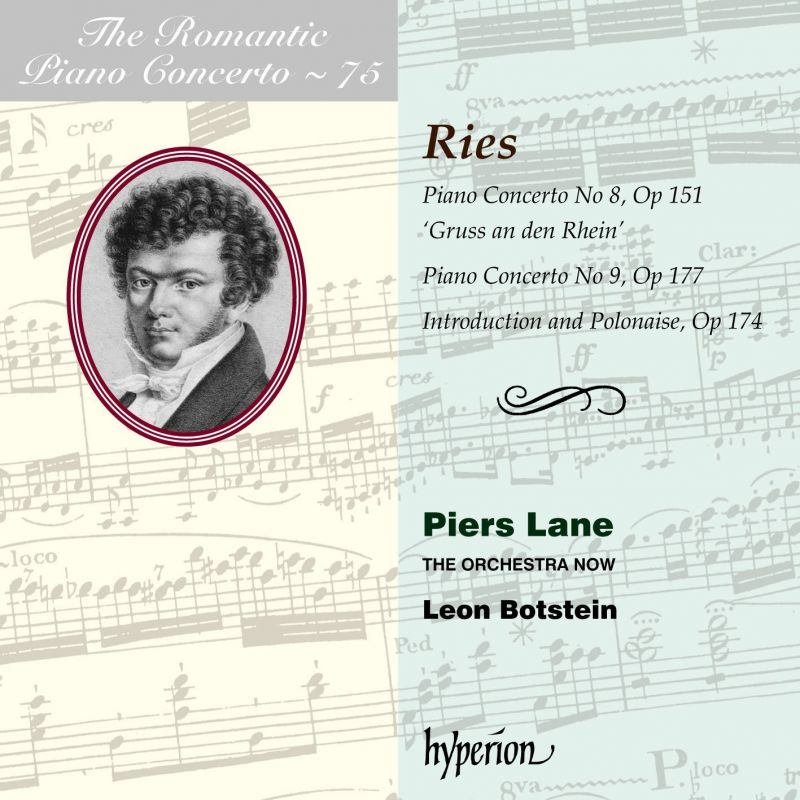RIES Piano Concertos Nos 8 & 9
View record and artist detailsRecord and Artist Details
Composer or Director: Ferdinand Ries
Genre:
Orchestral
Label: Hyperion
Magazine Review Date: 05/2018
Media Format: CD or Download
Media Runtime: 73
Mastering:
DDD
Catalogue Number: CDA68217

Tracks:
| Composition | Artist Credit |
|---|---|
| Concerto for Piano and Orchestra No 8, 'Gruss an den Rhein' |
Ferdinand Ries, Composer
Ferdinand Ries, Composer Leon Botstein, Conductor Orchestra Now Piers Lane, Piano |
| Introduction and Polonaise |
Ferdinand Ries, Composer
Ferdinand Ries, Composer Leon Botstein, Conductor Orchestra Now |
| Concerto for Piano and Orchestra No 9 |
Ferdinand Ries, Composer
Ferdinand Ries, Composer Leon Botstein, Conductor Orchestra Now Piers Lane, Piano |
Author: Jeremy Nicholas
The A flat Concerto, published in 1827, bears the subtitle Gruss an den Rhein (‘Greeting to the Rhine’), celebrating Ries’s return to his native land after living in London for 11 years. It last appeared in these pages in January 2006 when I welcomed a splendid recording on Naxos by Christopher Hinterhuber and the New Zealand Symphony Orchestra under Uwe Grodd. The Introduction and Polonaise, Op 174, appeared the following year and the Piano Concerto No 9 in G minor in 2012, played by the same forces. If you have these three discs, is it worthwhile investing in the new Hyperion release? On balance, no.
The A flat Concerto, by far the best piece here, is a delightful work more reminiscent of Weber and Hummel than Beethoven, yet it remains obstinately less interesting than anything by these three geniuses. One reason is that, for all Ries’s skill as a composer, the thematic material is simply not on the same level of inspiration – and melodic memorability is the key ingredient for the most successful of these Romantic Piano Concertos. Two excellent recordings of the work are, frankly, one more than required and there is scarcely a cigarette paper between the two we have. Having said that, Piers Lane, who brings his customary flair and lyrical refinement to the first two movements of Op 151, turns the Rondo finale into a brilliant tour de force that will delight even the sourest of atonalists.
Others may be more tempted than me to return to the Introduction and Polonaise and the G minor Concerto for repeated hearings. Agreeable as they are, and even when played and recorded as well as this, there are other more compelling works that have superior claims to Hyperion’s attention.
Discover the world's largest classical music catalogue with Presto Music.

Gramophone Digital Club
- Digital Edition
- Digital Archive
- Reviews Database
- Full website access
From £8.75 / month
Subscribe
Gramophone Full Club
- Print Edition
- Digital Edition
- Digital Archive
- Reviews Database
- Full website access
From £11.00 / month
Subscribe
If you are a library, university or other organisation that would be interested in an institutional subscription to Gramophone please click here for further information.




